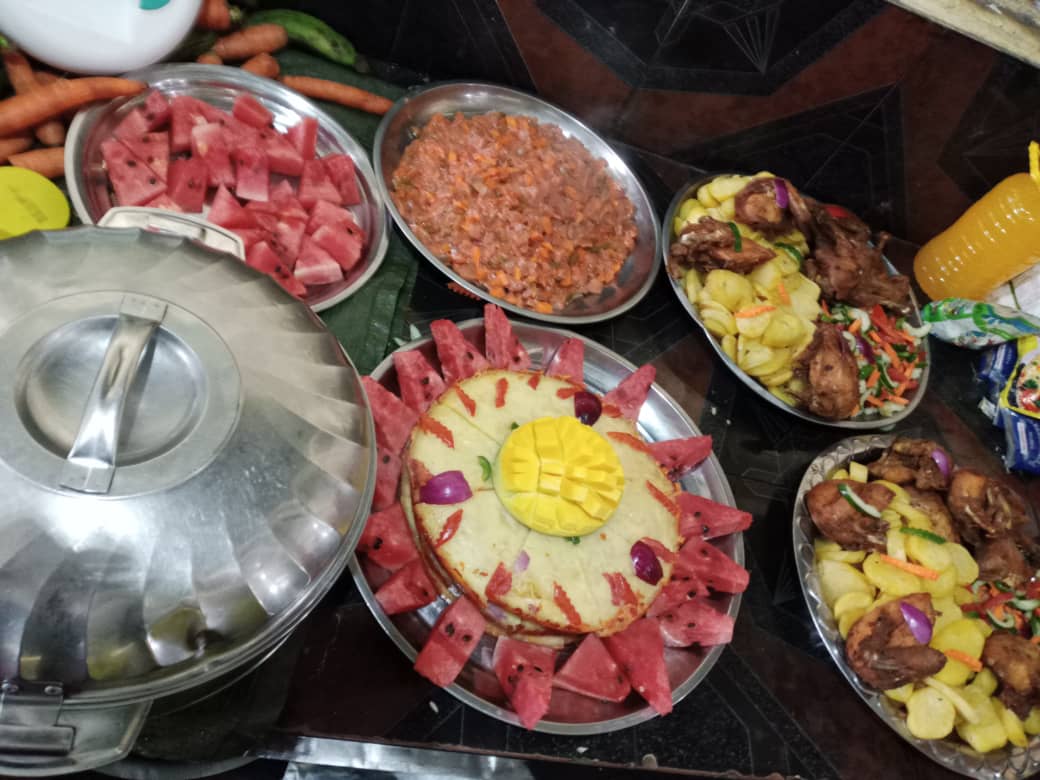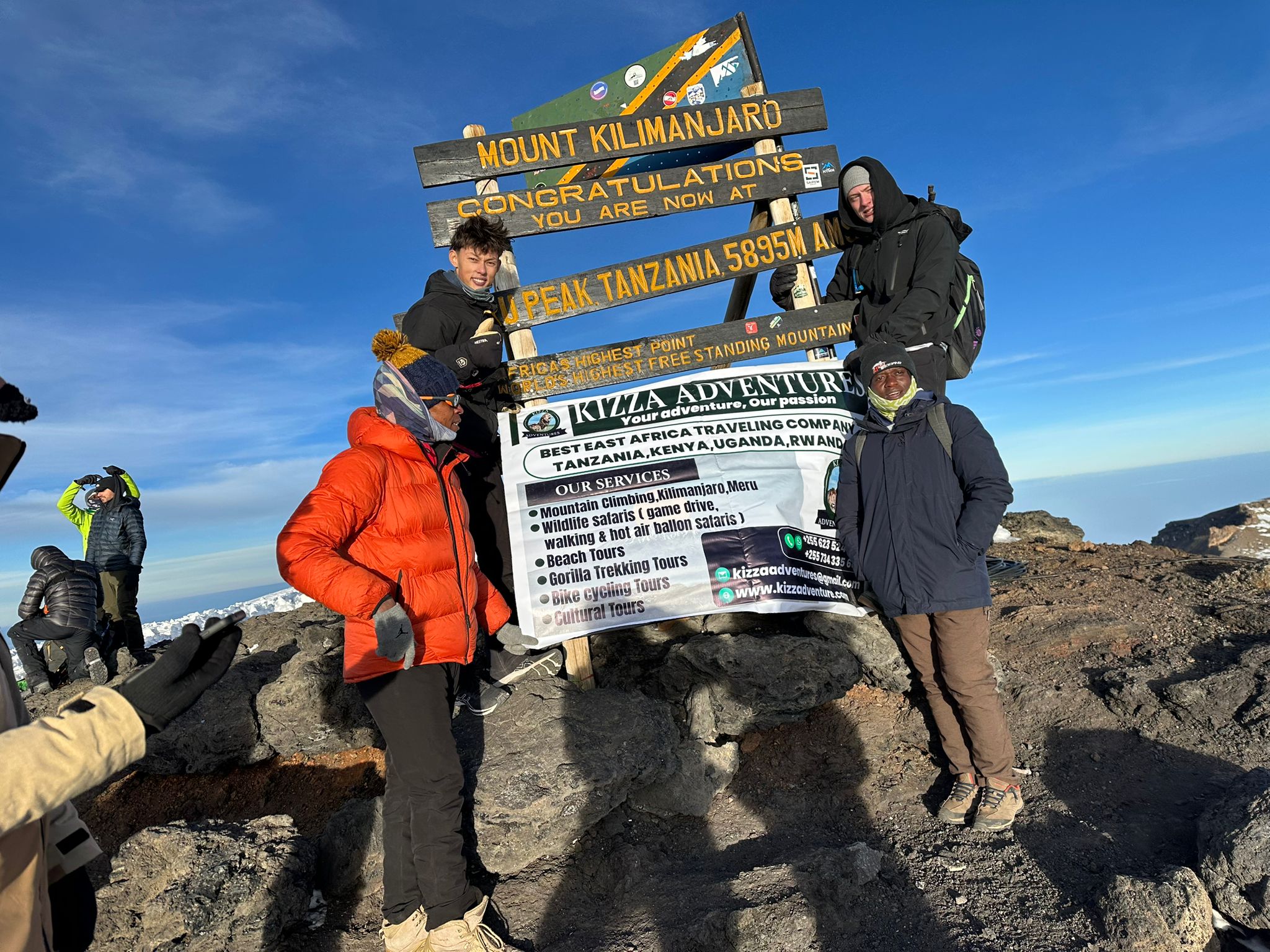Factors Affecting Kilimanjaro Climbing Costs
Professional Guides and Crew
A quality climb includes experienced guides, porters, and cooks who ensure your safety and comfort.
Reputable companies invest in well-trained teams who understand the mountain’s terrain, altitude challenges, and emergency protocols.
Park Fees and Permits
The Tanzanian government charges park entry fees, camping fees, and rescue fees, which amount to approximately $800 to $1,000 per climber.
These fees help maintain the park and provide emergency services when needed.
Food and Accommodation
Trekkers require daily meals, purified water, and proper accommodation along the route. Luxury options may include larger tents,
comfortable sleeping arrangements, and nutritious meals to keep climbers energized throughout the journey.
Equipment and Logistics
A well-equipped trek requires quality camping gear, including tents, sleeping bags, and safety equipment such as
oxygen tanks and first-aid kits. Reliable logistics ensure your climb is smooth and stress-free.
Safety and Emergency Services
A responsible tour operator provides medical support, trained rescue teams, and satellite communication. These elements
significantly impact the cost but are essential for your well-being.
Why You Should Avoid Cheap Climbing Packages
While budget options may seem attractive, they often come with serious compromises. Cheap operators may cut costs by underpaying porters,
using outdated gear, or skipping essential safety measures. This can lead to dangerous situations, poor service, and a higher risk of
altitude sickness due to improper acclimatization.
A well-planned, safe, and comfortable Kilimanjaro climb requires investment. Choosing a reputable company
like Kizza Adventures ensures an unforgettable experience with top-tier safety, expert guidance, and unmatched hospitality.
When booking your trek, consider quality over price to maximize your enjoyment and success on Africa’s highest peak.
Why You Should Be Cautious of Cheap Climbing Packages in 2025/2026
While budget-friendly Kilimanjaro climbs might seem appealing, they often come at a significant risk.
Low-cost operators may cut corners by underpaying porters, using substandard equipment, or neglecting essential safety measures.
This can lead to poor service, increased risks of altitude sickness due to inadequate acclimatization, and even life-threatening situations.
A well-planned and safe Kilimanjaro trek requires a proper investment. Choosing a trusted company like Kizza Adventures ensures expert guidance, high-quality gear,
and a well-supported journey, maximizing your chances of a successful summit. Prioritizing quality over price guarantees a rewarding experience on Africa’s highest peak.
Understanding the Cost Breakdown
The cost to climb Kilimanjaro 2025/2026 is influenced by two main factors:
Park Fees and Permits – Every climber must pay mandatory fees to the Kilimanjaro National Park Authority. These cover entry permits, camping fees, conservation fees, and rescue services.
Operational Expenses – This includes fair wages for guides and porters, high-quality equipment, food and medical supplies, transportation, and logistics to ensure a seamless expedition.
Park Fees for 2025-2026
As of 2025, the cost to climb Kilimanjaro includes approximately $1,000 per climber in park fees for a seven-day expedition. This covers essential expenses like guide and porter entrance fees,
rescue services, and conservation efforts. The National Park Authority periodically adjusts these rates, typically increasing them by 10-15% every few years.
By understanding how much does it cost to climb Kilimanjaro 2025/2026, you can make an informed choice and ensure your adventure is both safe and unforgettable.
Park Fees for Climbing Kilimanjaro in 2025-2026
One of the key components affecting how much does it cost to climb Kilimanjaro 2025/2026 is the mandatory park fees set by the Kilimanjaro National Park Authority. These fees cover essential services such as conservation efforts, rescue services, and facility maintenance, ensuring climbers have a safe and well-regulated experience.
As of summer 2025, the following park fees apply (prices listed without VAT):
| Fee Type |
Regular Travelers |
Tanzanian Residents |
| Ecological Fee (per day) |
$70 |
$35 |
| Camping Fee (per night) |
$50 |
$50 |
| Marangu Route Hut Fee (instead of camping) |
$60 |
$60 |
| Rescue Service Fee |
$20 |
$20 |
| Guide Escort Fee (per guide) |
$20 |
$20 |
| Team Fee (porters, cooks, support crew) |
5000 TZS per participant |
5000 TZS per participant |
Important Notes About Park Fees
Tanzanian resident rates apply only to those living and working in Tanzania with valid residence permits.
Unlike daily park fees, the rescue service fee is a one-time payment for the entire trek. However, this does not cover helicopter evacuation or hospital treatment—only ground rescue from lower camps.
The team fee is a one-time charge for porters, cooks, and camp staff for the entire expedition, not per day.
Additional charges apply for professional filming on the mountain and for those using the Kilema bicycle route.
Since July 1, 2024, park fees must be paid in Tanzanian shillings, though they remain pegged to USD for consistency.
Understanding these park fees is crucial when determining the cost to climb Kilimanjaro 2025/2026. These mandatory expenses, combined with guide wages, equipment, and other logistics, ensure a high-quality and safe trekking experience. Always choose a reputable operator that includes all necessary fees in their pricing to avoid hidden costs or compromised services.
Camping and Safety Equipment costs
The foundation of Kizza Adventures' expeditions is safety, which calls for additional funding. Oximeters, complete medical kits, and oxygen systems are carried by mountain teams.
The first-aid kits' medications are routinely inspected and changed
if they are about to expire, and oxygen tanks are replenished after every use.
Before every climbing season, new stretchers and oximeters are bought.
Radios, oximeters, sleeping tents, big dining tents, camping tables and chairs, first aid kits, and other equipment are necessary for Kilimanjaro climbing.
High import taxes are paid to bring nearly all of these goods into Tanzania from overseas.
It's dangerous to use outdated equipment for extended periods of time because tents can leak in wet weather and oxygen
systems that aren't properly maintained can malfunction at crucial times.
Accommodation Costs Before and After climbing Kilimanjaro in 2025/2026
As previously mentioned, guests staying under the classic tariff spend both the pre-climb and post-climb nights in cozy 3-star hotels. Those who choose the premium tariff stay in five-star hotels.
This has a big impact on the Kilimanjaro Climbing ultimate cost. A simgle room in the first scenario costs between $25 to $100. A double room costs between $35 to $150. A triple room costs between $50 to 200.
Meals cost to climb Kilimanjaro on 2025/2026
 The amount of food needed for a Kilimanjaro climb is substantial. The cooks make bigger portions because the team and the climbers have higher
calorie and carbohydrate requirements in the mountains. On the third or fourth day of the expedition, a dedicated group of porters brings extra fresh meat,
vegetables, and fruits straight to the Kilimanjaro camp to guarantee that meals are always prepared with fresh ingredients. The cost of the tour includes these expenses.
The amount of food needed for a Kilimanjaro climb is substantial. The cooks make bigger portions because the team and the climbers have higher
calorie and carbohydrate requirements in the mountains. On the third or fourth day of the expedition, a dedicated group of porters brings extra fresh meat,
vegetables, and fruits straight to the Kilimanjaro camp to guarantee that meals are always prepared with fresh ingredients. The cost of the tour includes these expenses.
cost for mountain teams in 2025/2026
Kilimanjaro National Park regulations require that a mountain team accompany every expedition climbing Kilimanjaro. There are three to four staff members
for every traveler, and five to six for premium expeditions. It takes this many people to plan a comfortable and safe climb.
Camp masters set up camp, cooks prepare meals, porters carry tents, equipment, oxygen tanks, and food supplies, and guides lead visitors to the summit and perform medical examinations. To transport food, gear, and tents for the crew serving the passengers, more porters are required.
With the highest salaries in the area, Kizza Adventures guarantees that the most qualified and experienced experts will accompany you to the top of Kilimanjaro. For a seven-day expedition, the mountain team members' salaries as of 2025 are:
| Team Position |
Salary for 7 Days (USD) |
| Guides |
$210 each |
| Cook |
$140 |
| Porter |
$70 |
Since it is illegal to erect permanent camps or food stores on Kilimanjaro, the team must carry everything they need for the climb,
so cutting back on team size to save cost to climb kilimanjaro is not an option.
Such a load would simply be too heavy for fewer porters to handle.
Each porter is allowed to carry a maximum of 20 kilograms per national park regulations. Rangers keep a close eye on compliance.
They weigh the load that the porters are carrying in each camp.
transpot costs 2025/2026
All transportation costs are included in the Kilimanjaro climbing cost. You will be met at the airport and driven to your hotel when you arrive. Y
ou will be driven to the national park's entrance the following day, and following the ascent, you will be taken back to your hotel before being driven to the airport on the day of departure.
All transfers take place in internet-connected, cozy, and well-maintained Toyota Alphard and Hiace cars. Professional drivers operate them, and The Heritage, one of Tanzania's top insurance providers, insures each journey.
The total cost of the expedition is greatly impacted by the price of fuel. Fuel costs more in Tanzania than it does in the US, defying the myth that everything is inexpensive in Africa.
License fees and taxes
Kizza Adventures pays all taxes due and operates in an open manner. These taxes in Tanzania are similar to those in Europe. The cost of the Kilimanjaro climb includes the 18% VAT and 30% income tax that we pay.

 The amount of food needed for a Kilimanjaro climb is substantial. The cooks make bigger portions because the team and the climbers have higher
calorie and carbohydrate requirements in the mountains. On the third or fourth day of the expedition, a dedicated group of porters brings extra fresh meat,
vegetables, and fruits straight to the Kilimanjaro camp to guarantee that meals are always prepared with fresh ingredients. The cost of the tour includes these expenses.
The amount of food needed for a Kilimanjaro climb is substantial. The cooks make bigger portions because the team and the climbers have higher
calorie and carbohydrate requirements in the mountains. On the third or fourth day of the expedition, a dedicated group of porters brings extra fresh meat,
vegetables, and fruits straight to the Kilimanjaro camp to guarantee that meals are always prepared with fresh ingredients. The cost of the tour includes these expenses.

